




In September 2019, AmeriHealth Caritas New Hampshire began serving 3,000 enrollees in New Hampshire’s Medicaid Care Management program. At the time of this report, our membership has grown to more than 53,000 enrolled members. While our plan is invested in improving health in the Granite State, we are backed by one of the nation’s leaders in health care solutions for those most in need.
AmeriHealth Caritas has been operating for nearly 40 years, serving more than five million Medicaid, Medicare, and Children’s Health Insurance Program (CHIP) members through its integrated managed care products, pharmaceutical benefits management and specialty pharmacy services, and behavioral health services.
The organization’s whole-person approach to care includes addressing the acute and broader social factors that drive health outcomes. These factors — which include things like access to nutritious food, safe housing, and employment and education — are typically known as social determinants of health. But AmeriHealth Caritas believes these social factors are more accurately described as Social Determinants of LifeSM since they can engender or inhibit wellness and opportunity.
With the launch of AmeriHealth Caritas New Hampshire, the national footprint of AmeriHealth Caritas was expanded and the commitment to forge pathways for people to journey from wellness to resilience was strengthened. New Hampshire’s Medicaid enrollees have diverse backgrounds and wide-ranging needs that require us to look beyond health outcomes and leverage our unique expertise and grassroots approach to improve life outcomes.
And so we continue the tradition of care by advancing the mission to help people get care, stay well, and build healthy communities. AmeriHealth Caritas New Hampshire not only covers a wide range of physical and behavioral health services, we also offer core programs that work to motivate, inspire, and provide opportunities for members of all ages to live healthier lifestyles.
For nearly 40 years, AmeriHealth Caritas has provided care and support to underserved populations across the country. Our mission — to help members get care, stay well, and build healthy communities — is more than just a motto. It’s our history. From our start in a small hospital in Pennsylvania, which opened its doors to provide health care to a community in need,1 to our status today as a national leader in managed care solutions, serving our members and communities is the heart of our work.
That unwavering tradition continues through the work of AmeriHealth Caritas New Hampshire. This report highlights how we serve our members throughout the state, make positive impacts in the community, and partner with local organizations and individuals to increase access to the Social Determinants of LifeSM. These partnerships are integral to our whole-person approach to care, as well as our initiatives designed to bridge the gaps of health disparities.
The year 2020 rapidly shifted the landscape in health care, presenting each of us with unprecedented challenges in many areas of our lives. AmeriHealth Caritas New Hampshire took on these challenges with steadfast resolve to meet the needs of those who depend on us by adjusting the way we deliver some of our programming. In addition, our care management teams reached out individually to members to offer support, help address social and physical barriers to care, and deliver important information on health guidelines and resources. We also led training sessions to answer provider questions and support those navigating telehealth for the first time. While many things have changed, one constant is our dedication to connecting members to high-quality equitable care. We are honored to have been selected by the Department of Health and Human Services (DHHS) to bring our culture of care to the Granite State.
Paul A. Tufano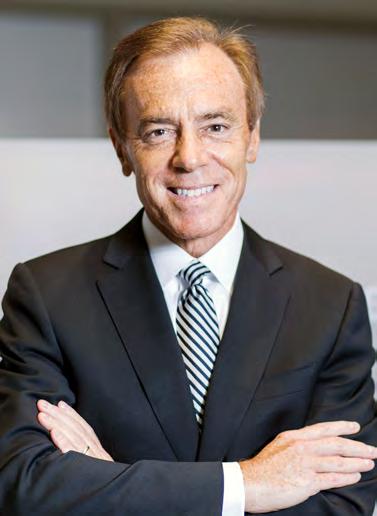
53,000+ Members*
9,300+ In-network providers*
$1 MILLION+ Dental benefit coverage for members*
$600,000+
CARE Card rewards earned for healthy behaviors to use towards purchasing household necessities*
500+ Car seats distributed to members, ($210 value per item) including infant seats delivered just in time to bring our newest members home safely*
It is with great pleasure that I present AmeriHealth Caritas New Hampshire’s first biannual Report to the Community. For me, this is an opportunity not only to share highlights of the plan’s many accomplishments since our September 2019 launch, but also to introduce myself as a new member of the AmeriHealth Caritas New Hampshire family.

I was appointed Market President in September 2021, and it is truly an honor to be leading such a dedicated team. Having served in the health care and health insurance marketplace for more than 37 years, I understand the critical missions of increasing access to quality care and advancing health equity. AmeriHealth Caritas New Hampshire is on the front lines of addressing health and other socioeconomic disparities, many of which were laid bare by events that continue to take place during the pandemic.
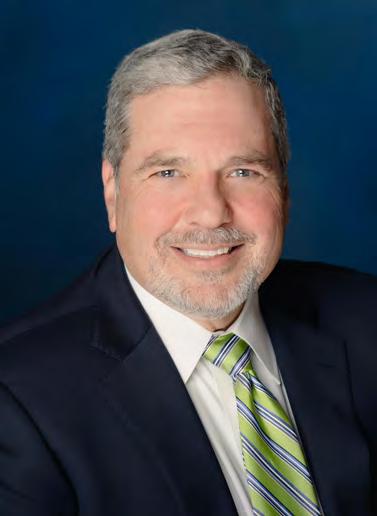
As I read through the pages of this report, I am moved by the impact AmeriHealth Caritas New Hampshire has already had on the state and its residents in greatest need through our dedication to creating a whole-person, community-focused culture of care. I am inspired by those we serve.
Just six months after we joined New Hampshire’s Medicaid Care Management program, COVID-19 rapidly shifted the landscape in health care, presenting each of us with unprecedented challenges in many areas of our lives. We are still experiencing times of much uncertainty in our communities. Through it all, AmeriHealth Caritas New Hampshire has taken on these challenges with steadfast resolve and a continued focus on meeting the needs of those who depend on us.
While many things have changed, the one constant is our resolve to connect members to high-quality equitable care and work with community and provider partners to break down barriers that impact the health of people in our state. We look forward to serving our members in new and creative ways — including launching our Community Wellness Center in 2022 — and helping them on their health care journey.
Bill Keena Market President, AmeriHealth Caritas New Hampshire
William had been living in a Manchester-based homeless shelter for more than a year when he met Donna Marsh, a former Outreach Consultant assisting AmeriHealth Caritas New Hampshire, in January of 2021. The large shelter was in dire need of case management support and had reached out to the state’s three managed care organizations for help. Donna was one of the people AmeriHealth Caritas New Hampshire asked to assist at the shelter. Following a serious accident, William developed blood clots that resulted in the amputation of both of his legs. “William’s only material possessions were his wheelchair and a single backpack containing his personal items,” recalls Donna. “But he also possessed a strong desire to improve his life. He sought me out for help.”
William asked Donna if she could help him in his efforts to secure housing and get medical treatment. Although he already had some of the necessary paperwork and applications needed for housing assistance, there were glitches with documentation needed to verify his eligibility. “I went to the shelter manager to find out what had been done up to this point to sort out the problems,” explained Donna. “I just picked up the baton and went from there. Basically, we — the AmeriHealth Caritas New Hampshire Rapid Response and Outreach and Care Management teams — were starting at ground zero.”
It required a lot of time and several phone calls, but finally William and Donna succeeded in establishing his eligibility for housing assistance. Initially he was granted an emergency housing voucher that enabled him to move to a hotel temporarily while Donna worked with a coordinator at Nashua-based Harbor Care to get William into stable housing. In May 2021, the persistence paid off. William moved into his new apartment, which a local church helped to fully furnish. Donna helped him apply for SNAP benefits and connected him to a community food pantry to get groceries.
William had been employed as a welder for the Vermont Highway Department before grand mal seizures associated with epilepsy forced him to go on Social Security. When he moved to New Hampshire, he went without health care coverage until he joined AmeriHealth Caritas New Hampshire. Although he had managed to keep his medications up to date, William — challenged by epilepsy, the loss of his legs, and other health issues — needed to get his physical health stabilized before he could be considered for prosthetics. AmeriHealth Caritas New Hampshire Nurse Care Manager Elizabeth Corrado worked with William on the long road to
help him reach compliance with his treatment plan. Finally, in November of 2021, he began the process of being fitted for prosthetics at Next Step Bionics and Prosthetics in Manchester.
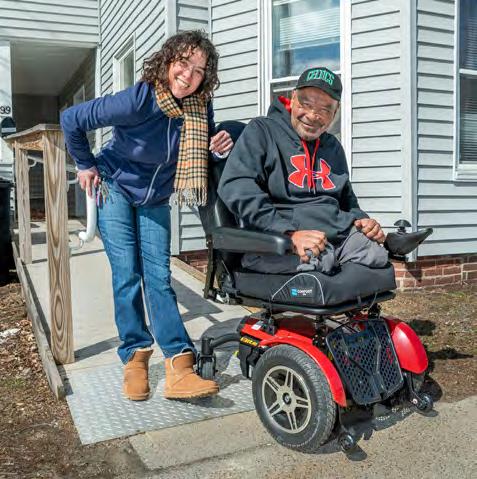
It will take approximately six to nine months of physical therapy to rebuild leg strength and learn how to balance at each stage of prosthetic progression. Currently, William’s prosthetics reach just below the knee area. He is proud of his progress in learning how to navigate parallel bars and perfect turning motions. Before he met Donna and Elizabeth and had the support of AmeriHealth Caritas New Hampshire on his wellness journey, William thought this would never happen. Now it’s just a matter of time and hard work in physical therapy before William’s dream of full independence becomes a reality.

“Being out of the shelter means everything. I’m fully self-sufficient and I feel safe here. I like having my own bed, kitchen, TV, and laundry facilities. And it’s nice to have neighbors. Most of all, I enjoy the peace and serenity.”
William, AmeriHealth Caritas New Hampshire member
AmeriHealth Caritas New Hampshire is the only Medicaid health plan in the state to offer eligible adults ages 21 and older a dental benefit that includes exams, routine cleanings, and restorations. Oral health is an important component of overall physical health. Offering this value-added benefit is part of our integrated care model, which emphasizes caring for the whole person to help improve our members’ well-being and quality of life.
We greatly appreciate the dedicated dental providers who care for our members by delivering oral health care to individuals around the state who might otherwise go without.
“By including a value-added adult dental benefit, AmeriHealth Caritas New Hampshire opens the door to improved overall health and well-being to those impacted by dental disease. Dental disease has been associated with more than 140 health problems, including diabetes, heart disease, arthritis, and pneumonia. A healthy mouth helps ensure the ability to eat, speak, and smile with confidence.”
 Gail T. Brown, Director, New Hampshire Oral Health Coalition
Gail T. Brown, Director, New Hampshire Oral Health Coalition
Other programs and services are designed to help meet our members’ everyday needs. Two of our most popular benefits are the provision of appropriate-sized car and booster seats for infant and child members (up to a $210 value), and cell phones for members who do not qualify for the SafeLink Wireless® phone program. In addition, we offer the following:
• Bright Start® maternity program: Members can get help scheduling OB/GYN appointments, get transportation assistance for office visits, attend community baby showers where they can meet with certified breastfeeding instructors, and receive other supports and resources to help have a healthy pregnancy and baby.
Mission GED®: Qualifying adult members can receive support to earn their high school equivalency exam (HiSET® in NH) (up to a $125 value).*
• Healthy weight management with WW® (formerly Weight Watchers): Eligible members can get a six-month online membership at no cost (up to a $250 value.)*
• Home education visits for children: We provide home visits to address home-based asthma triggers to qualifying members. In Manchester, we work with the Manchester Department of Public Health to provide that service.
• Living Beyond Pain: Members living with chronic pain can enroll in care coordination to access alternative pain management strategies as part of a person-centered plan. Members can get referrals to and coverage for appropriate pain management alternatives, such as acupuncture and chiropractic therapy, not to exceed 12 visits each of acupuncture and chiropractic therapy per member per benefit year.
• Home-Delivered Meals: Members being discharged after a qualifying inpatient hospital stay may be eligible to receive 14 home-delivered meals (two meals a day for seven days) post discharge. Meals for eligible members with dietary restrictions are prepared according to dietary guidelines (up to a $175 value). Qualifying stays include those for:
New moms in recovery from substance use disorder.

– Members with substance use disorder who successfully complete an inpatient substance use disorder treatment program as part of the Flexible Recovery Benefit.
– Adult members (ages 21 to 64) with heart disease or diabetes.
In 2019, AmeriHealth Caritas New Hampshire contracted with SolutionHealth, a regional health care network that comprises Manchester-based Elliot Health System and Nashua-based Southern New Hampshire Health. This agreement provides our members with access to highvalue care in New Hampshire’s largest communities.
Nashua and Manchester area families have received care from Elliot Hospital System and Southern New Hampshire Health for generations. As New Hampshire’s newest Medicaid health plan, we are proud to work with health care professionals who are committed to innovative models of care and collaboration that improve the health and wellbeing of their patients.
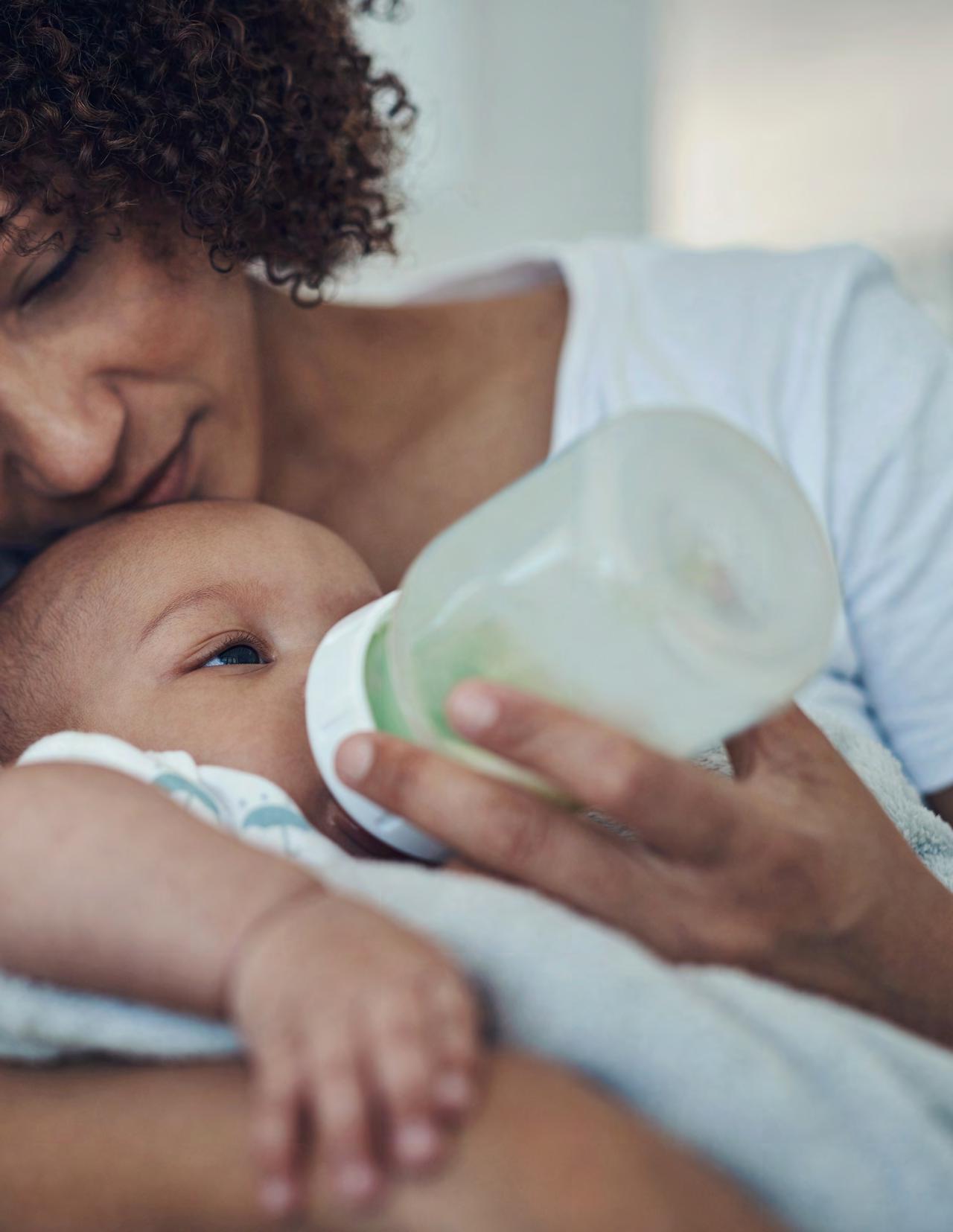
AmeriHealth Caritas New Hampshire began operations in September 2019. In the first quarter of 2020, a national public health emergency (PHE) was declared which necessitated pivoting to help ensure we maintained continuity of care and service to our members and communities.
Fulfilled requests for a variety of items:
• Diapers — Laconia-based Salvation Army and Manchester-based Makeover Ministries.
• Plastic bags — Manchester-based 1269 Café.
• Fever scanners and disinfecting wipes — The Mental Health Center of Greater Manchester.
• Purell hand sanitizer and disinfecting wipes — Manchesterbased Amoskeag Health.
• Face masks — Manchester-based Families in Transition.
Reallocated sponsorship funds to several strategic partners:
$25,000 Match Grant, United Way of Greater Nashua.
$10,000 Families in Transition (FIT) of Manchester
$10,000 Manchester-based Catholic Charities New Hampshire Food Bank.
$5,000 1269 Café.
$5,000 Great North Woods Charitable Foundation.
$3,000 Salvation Army, Laconia.
$2,000 Greater Tilton Area Family Resource Center. (Also provided on-site winter shelter case management support during the pandemic.)
Through AmeriHealth Caritas New Hampshire’s CARE Card program, members may be eligible to earn rewards for doing things that help them stay healthy, such as completing:
• The Health Risk Assessment.
• Child and teen well visits.
• HbA1c screenings.
• Mammograms.
• Follow-through actions to engage in Care Management program.
• Postpartum visit within seven to 84 days of delivery.
Members may use the CARE Card rewards to pay for eligible items, including baby care products, eye care products, over-the-counter medicines, and healthy foods.
Launched AmeriHELP to reallocate community health workers and outreach staff to serve our members:
• Provided phone outreach and answered incoming calls from members needing specialized support and access to resources in order to stay safe and healthy.
• AmeriHELP team attended Integrated Delivery Network (IDN), United Way, and other community meetings to stay apprised of the state’s most up-todate information and resources.
• Helped ensure value-added benefits, such as WW® program access, and incentives continued to be made available.
• Found creative ways to safely engage and conduct no-contact distribution of items, including:
– Car seats and booster seats.*
– Mission GED® program coaching.
– SafeLink Wireless® support.
“Supporting efforts to deliver relief to those most in need by assisting local agencies where the need is greatest, and coordinating volunteer efforts for things like grocery delivery services and food distribution initiatives for the region’s school children, exemplifies how AmeriHealth Caritas New Hampshire lives our mission to help people get care, stay well, and build healthy communities. These may be just little things, but it’s the little things that make us special. This is how we’re able to do a lot with what we have; it’s how we foster relationships that allows us to address immediate needs and really help.”
NicoleSt. Hilaire, Market Development Director, former Director, Member Engagement
It is often said, “Teamwork makes the dream work.”1 At AmeriHealth Caritas New Hampshire, our Member Advisory Board is definitely part of our team. Member feedback helps us to know what’s working and where changes can be made in order to deliver service excellence and help ensure the best possible member experience.
The quarterly meetings are opportunities for plan members and our associates who serve on the Member Advisory Board, as well as the Public Affairs and Quality Assurance teams, to talk about what it’s really like to be an AmeriHealth Caritas New Hampshire member. Discussion topics include items such as the plan’s health education and new member orientation materials, website navigation, and ease of using our member apps and CARE Card rewards program.
It was during one of these meetings that we discovered that a CARE Card kiosk at a Walmart store in a remote location was out of order and members were unable to take advantage of this addedvalue benefit. Without this information, we wouldn’t have known that it needed to be fixed. Feedback from the Member Advisory Board has helped us make a few changes to our rewards program to get actionable results that ultimately help to improve health outcomes.
“The Member Advisory Board is about doing real work with real people. It’s about breaking down barriers, gaining trust, and helping to ensure benefits can be used as intended.”
Isiah Anderson, former Public Affairs Specialist
“Being part of AmeriHealth Caritas New Hampshire’s Member Advisory Board is very important to me because I know my input is helping the other members. I’ve developed a strong connection with the other participants and I know they take my advice seriously through the changes they’ve made companywide. Most insurance companies try to pay out as few claims as possible. I was pleasantly surprised by the effort taken to communicate to all plan members what benefits are offered. The plan has also taken the time to focus on what benefits would be especially useful to individual members. I have had the pleasure of discussing the current benefits, sharing how they can be better, and even suggesting new benefits that would help many of the members. This just doesn’t happen at other insurance companies, and I feel honored that they want me to represent the membership.”
Nathan Freedman, AmeriHealth Caritas New Hampshire member
“You have to meet people where they are. It’s the key to successful outreach to Medicaid members,” said Isiah Anderson. “That’s my personal philosophy, and it really aligns with AmeriHealth Caritas New Hampshire’s vision and mission of not just bringing health care to people, but helping to change the trajectory of their lives. Health care is a scary process for many people, so AmeriHealth Caritas New Hampshire approaches them as their health coach,” he continued. “The plan helps its members in a way that helps to ensure they don’t feel embarrassed by what they don’t know or ashamed to be on Medicaid.”
As a former Public Affairs Specialist for AmeriHealth Caritas New Hampshire, Isiah served as a public face for the health plan. A diverse career path prepared him for this role. He has a degree in social work, served as a second lieutenant armor officer in the U.S. Army, and developed charter schools and alternative education schools. In addition, Isiah became a trained racial justice facilitator through his involvement with the Equity Leaders Fellowship and the Council of Churches.
“As a racial justice facilitator and thought leader, I can educate people about equity issues and have effective conversations. This puts me in a position to tune in to the real challenges — to fully understand the impact things like pharmacy deserts, food insecurity, and lack of housing and transportation have on our members,” he said.

This helps in facilitating the plan’s Member Advisory Board meetings and conducting new member orientations. “Instead of offering generalized information, we can specialize and tailor information focused on real needs,” he said. “Getting the right information to people and listening to their real-life experiences is key to breaking down the historical mistrust that exists. You need to take off the sunglasses to have relationships and honest conversations. For example, you may need to talk about cultural connections to unhealthy foods that contribute to chronic conditions. You have to be in the weeds to pull the weeds!”
He also noted the importance of supporting the community-based organizations where the people are really being served in order to affect outcomes. “You have to dig a little deeper; look beyond the more traditional sponsorships with organizations that may not be as effective in serving the real needs of the people. There’s a cohort of small nonprofits making a difference in the heart of the community,” he said.
One such organization is the Greater Tilton Area Family Resource Center in the Lakes Region. They do great work involving food, housing, substance misuse treatment and prevention, and transportation. The Executive
Director, Michelle Lennon, is a certified recovery support worker and the pastor of a small church in the community. Michelle reached out to the state’s managed care organizations to help purchase a van that is used to get people to medical appointments.

“This was a tremendous achievement,” explained Isiah. “There are no public transportation services in the Lakes Region. AmeriHealth Caritas New Hampshire offers reimbursement for getting rides to its members, but that doesn’t help if there is no access to a vehicle. For AmeriHealth Caritas New Hampshire members and other individuals who have the willingness to get to health care appointments but no way to do so, this is a great resource. The van also serves as a way to generate income while bridging a gap to help the broader community.”
Isiah said the best thing AmeriHealth Caritas New Hampshire members can know is that enrollment in the plan is not just a health card. “There are really people out there committed to helping members change their lives and change the lives of people in the community. New Hampshire is a small state where everything matters; you can see the changes quickly. AmeriHealth Caritas New Hampshire wants to be a part of the fabric.”
With sponsorship support from AmeriHealth Caritas New Hampshire, we have continued to grow the network of Certified Recovery Support Workers (CRSW) throughout the state. Without the plan’s support, we would not be able to make the training so affordable. It allows me the freedom to say “yes” when people say they can’t afford the classes, because the plan is covering the cost of the training materials.
One gentleman who completed the training was just interviewed for the Plymouth Area Recovery Connection, and a resident of a recovery home in Laconia was just hired as a coach-in-training. One of the trainees from this year’s program was recently made a house manager for a recovery home in Tilton, while another trainee just became the house manager of a Plymouth House recovery home.
— Michelle Lennon, CRSW Executive Director, Greater Tilton Area Family Resource CenterIt is so important for workers in the field to have the right information. Throughout the state, people have been very grateful that the CRSW training is available. Very often they have loved ones in recovery or are in recovery themselves. Some people are allies to recovery wanting to make a difference in the world. The training benefits everyone.
A community united around shared values and goals can achieve amazing results. That’s what happened when AmeriHealth Caritas New Hampshire, Boys & Girls Club of the Lakes Region, and University of New Hampshire (UNH) Cooperative Extension joined forces to help address obesity by teaching families about good nutrition and healthy meal preparation.
Our Public Affairs Specialists routinely visit local organizations that serve as community “anchors” to collaborate and share resources. It was during such a visit that Boys & Girls Club of the Lakes Region Operations Director Bob Carter mentioned that the grant money for the organization’s fresh food program was depleted. Obesity is a serious issue for some of the families they serve — families that want to make lifestyle changes but lack the knowledge about good nutrition to do so effectively.
Fortunately, we knew our community partners at the UNH Cooperative Extension had grant monies to support this type of programming and would be able to help.

Our collaboration resulted in Slow Cooker Meals Made Easy — a six-week program for parents and children who were enrolled in Medicaid or receiving financial or housing assistance. The instructor was Nutritionist Brenda Carey, who teaches income-eligible families and seniors how to make lifestyle changes for better health through UNH’s Nutrition Connections program.
AmeriHealth Caritas New Hampshire supplied 20 electric slow cookers, which the participants were able to keep. The classes were held at the Boys & Girls Club of the Lakes Region in a multipurpose room equipped with a kitchen. In addition to learning how to prepare vegan meals and taking home the healthy food, participants:
• Received a $25 gift card to use for groceries.
• Went on group grocery shopping trips with Brenda to learn how to shop and read food labels.
• Learned how to use a Supplemental Nutrition Assistance Program (SNAP) card.
• Received a cookbook to use with their new crockpot.
• Learned tips for how to be an active family.
“AmeriHealth Caritas New Hampshire didn’t just cut a check and disappear,” said Carter. “Some of their staff members attended the sessions to help out and engage with the program participants. They and UNH Cooperative Extension are truly part of the change.”
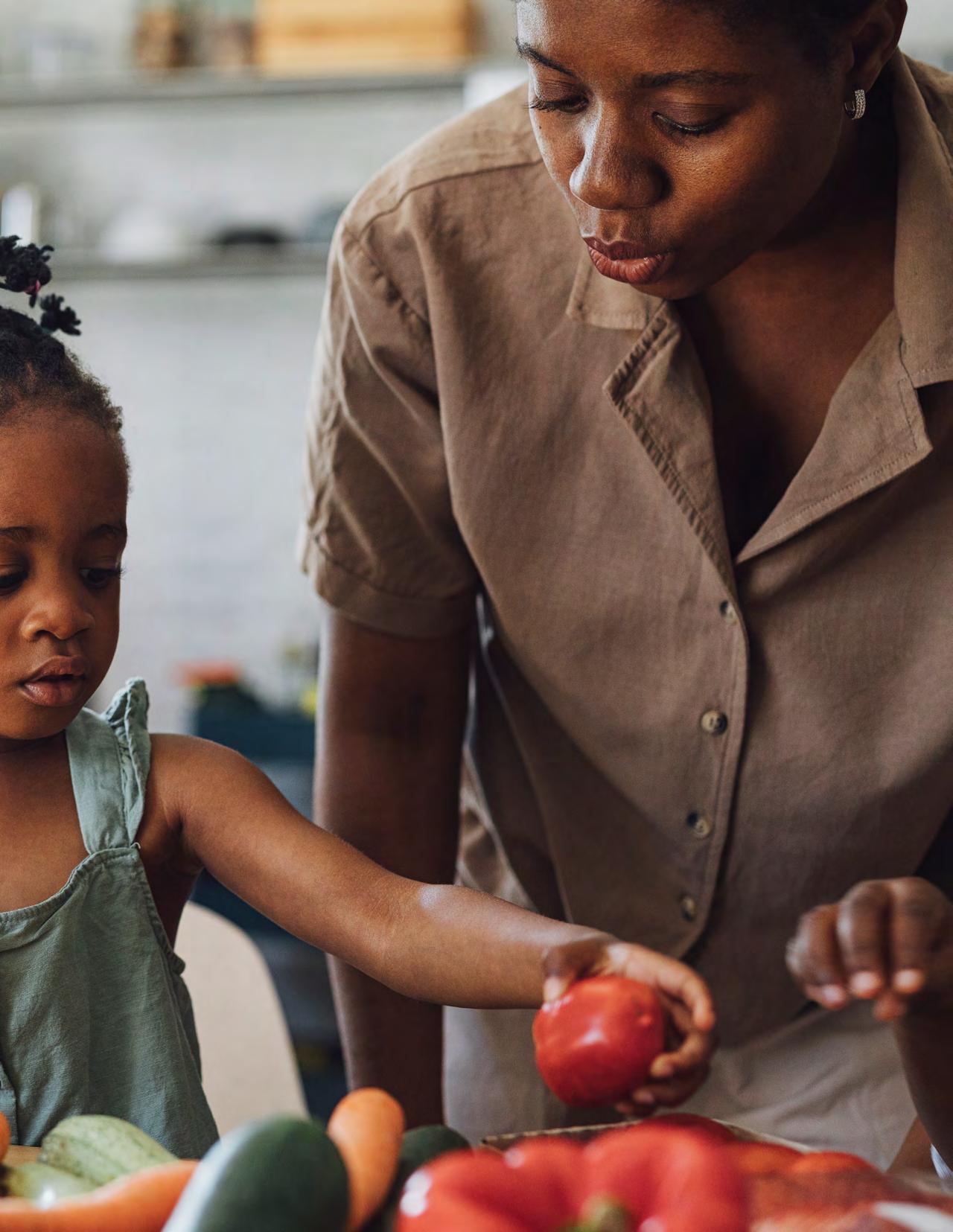
Jasmine Harris, Manager, Community Outreach for AmeriHealth Caritas New Hampshire, was going about her typical Friday routine of helping out at Manchester-based 1269 Café, a local community outreach organization the plan collaborates with to help people in need. For more than a decade, 1269 Café has been a refuge for homeless individuals, providing them with daily meals, offering laundry and shower facilities, clothing, and toiletries, and holding Sunday services. Jasmine was finishing up from the lunch service when a woman who recognized the AmeriHealth Caritas New Hampshire logo on Jasmine’s shirt approached her and said “Hey, I have you guys!” It was member Justine.
Both of Justine’s parents had severe untreated alcoholism and she grew up in an extremely challenging environment. “I always felt sad, lonely, afraid, and unloved,” she recalls. “In my early teens I started using drugs and alcohol to numb the pain.” The substance misuse continued to escalate as did feelings of deep resentment toward her parents. This led to verbal and physical altercations, and eventually at age 14 she was sent to live in a group home.
“I ran away from my last group home at 17 and that’s when I began using opioids,” said Justine. Then, at age 18, she became pregnant with her first child. “Around this time my mom reentered my life,” she continued. “My mom actually became my enabler — buying and sharing drugs with me. I guess it was like her way of making up for lost time.”
Justine’s drug use intensified. She had two more pregnancies but had to give up her children due to her inability to care for them. She found housing periodically, but would eventually end up homeless due to her using and selling drugs. “Someone tipped off the police that I was dealing,” said Justine. “I was arrested and sentenced to drug court. But I broke parole by continuing to use so I was court-ordered to an inpatient rehabilitation facility.” While she was in rehab, Justine said a “seed was planted” — her clean time was brief, but she began to think that just maybe she could be sober.
In 2018, Justine moved from Portland, Maine, to stay with a friend in New Hampshire. “I wound up living in Rochester in a trap house,” said Justine. (It’s a name for a dangerous place where drugs are used and sold and people are basically “trapped” by their addiction.) “A bad drug deal went down and my life was threatened,” she explained. This exacerbated her schizoaffective disorder, a chronic mental health condition that causes symptoms such as hallucinations, paranoia, and delusions. It can be triggered by stressful events.1
Justine was admitted to the emergency room for stabilization and then sent to Farnum Center in Manchester for substance misuse treatment. This was followed by an admission to a psychiatric unit to treat her severe paranoia. Once discharged, Justine went to Families in Transition shelter in Manchester where she started using again. “I did what I knew how to do,” she said. “I was trying to do good but I had no direction, no program. I didn’t trust anyone. The next thing I know, I’m living in a tent. I felt so broken, so defeated.” Then she met Jasmine.
During their initial conversation at 1269 Café, Justine told Jasmine what she was going through and how she was living in an encampment on the west side of Manchester on the banks of the Merrimack River. (An article published July 15, 2021, in the New Hampshire Union Leader reported on the increasing number of deaths due to drug overdoses at this site.2) Jasmine assured her that the AmeriHealth Caritas
 1. National Alliance on Mental Health, “Schizoaffective Disorder,” https://www.nami.org/About-Mental-Illness/ Mental-Health-Conditions/Schizoaffective-Disorder, accessed October 20, 2022.
1. National Alliance on Mental Health, “Schizoaffective Disorder,” https://www.nami.org/About-Mental-Illness/ Mental-Health-Conditions/Schizoaffective-Disorder, accessed October 20, 2022.
New Hampshire team could help Justine access care and connect her to other community resources. Jasmine and Justine exchanged phone numbers and for a while, at least, connected regularly through text messages and emails. Then Justine stopped answering her phone.

Feet-on-the street outreach is just one of the ways AmeriHealth Caritas New Hampshire seeks to maintain contact with at-risk members who are difficult to communicate with through phone or email. Jasmine started visiting Justine at the encampment, bringing her food and other necessities, like clean socks. “I promised her I would never stop communicating and encouraged her to please answer her phone,” said Jasmine. “Fortunately, with help from some caring individuals, Justine was able to keep her phone and the same phone number. That’s rarely the case for many homeless individuals,” she explained.
Justine’s mental health issues were increasing. During one of their visits, Justine told Jasmine that she was beginning to feel what she described as the gift of desperation. It was a pivotal moment. “I needed to feel safe. I wanted to get a shower and feel clean. I was in pain from sleeping on the cold, hard ground,” said Justine. “I knew I couldn’t be sober and homeless at the same time. I’ve always been ashamed of my diagnosis, but if I wanted to get sober, I needed to get honest about my mental health.”
Justine was admitted to inpatient mental health treatment where she remained for 26 days. “I used my AmeriHealth Caritas New Hampshire benefits to get myself better,” she said. “I remember thinking, ‘Wow, I haven’t used drugs or alcohol for four days; maybe I can do this. Otherwise, what am I going to do — go back to my tent?’ The clearer my head got, the clearer I saw the reality of my life.”
Following her hospitalization, Justine was admitted to Granite Recovery Center in Salem for three months, and then moved to a halfway house.
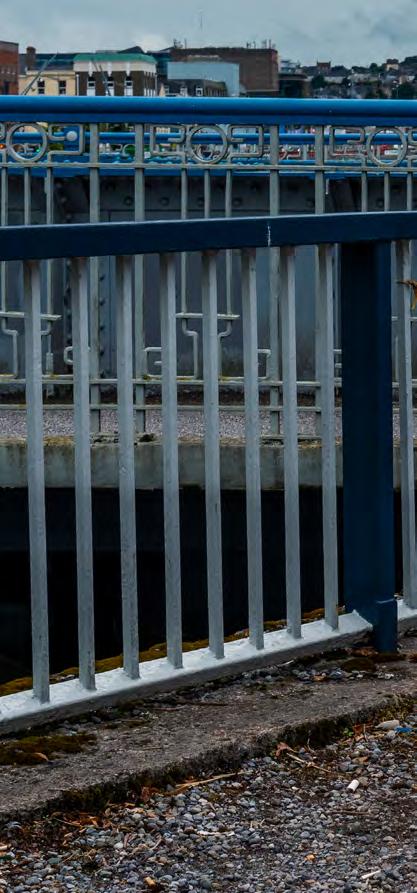
Jasmine got Justine in contact with Lakes Region Community Services Family Resource Center. The staff helped her connect with a peer recovery coach (PRC). The peer recovery coach has personal experience with addiction and recovery, completed specialized training, and receives supervision to provide Justine with nonclinical recovery support.
The staff also helped her move to a rooming house in Laconia with a sober environment where she has been living for more than a year now. “Staying in the same place for that long is huge for me,” said Justine. She attends Alcoholics Anonymous meetings via Zoom and is also receiving personalized nutrition counseling, including how to shop for food and prepare healthy meals, and has started an exercise program.
As a Medicaid beneficiary, Justine is eligible for services through the WorkNowNH program offered by the New Hampshire Department of Employment Security. She received individualized case management support, including referrals to community services and job readiness assistance, which eventually led to her finding employment.
In July 2021, Justine celebrated one year in recovery. Justine’s three children have been living with family members, but one of the goals of her recovery journey is to establish healthy relationships with them and,
hopefully, one day be reunited as a family. “I know this is going to take some time; there is a lot of work and healing yet to be done,” she said. Jasmine remains in contact with Justine by text or email every two to three weeks and continues to check dates stored in the plan’s medical management system to help ensure her health care is staying on track. “Justine’s is an amazing success story. She was extremely motivated and did the hard work to get to where she is today,” said Jasmine.
–
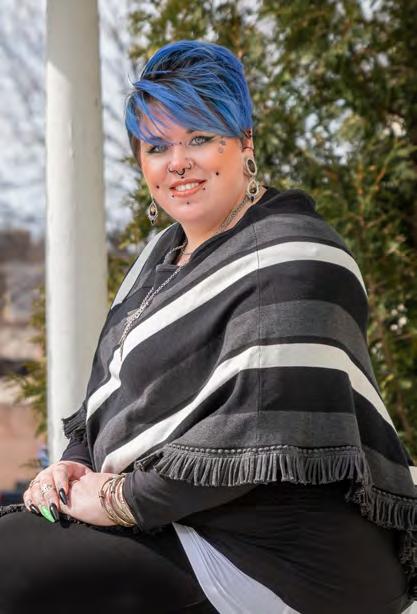
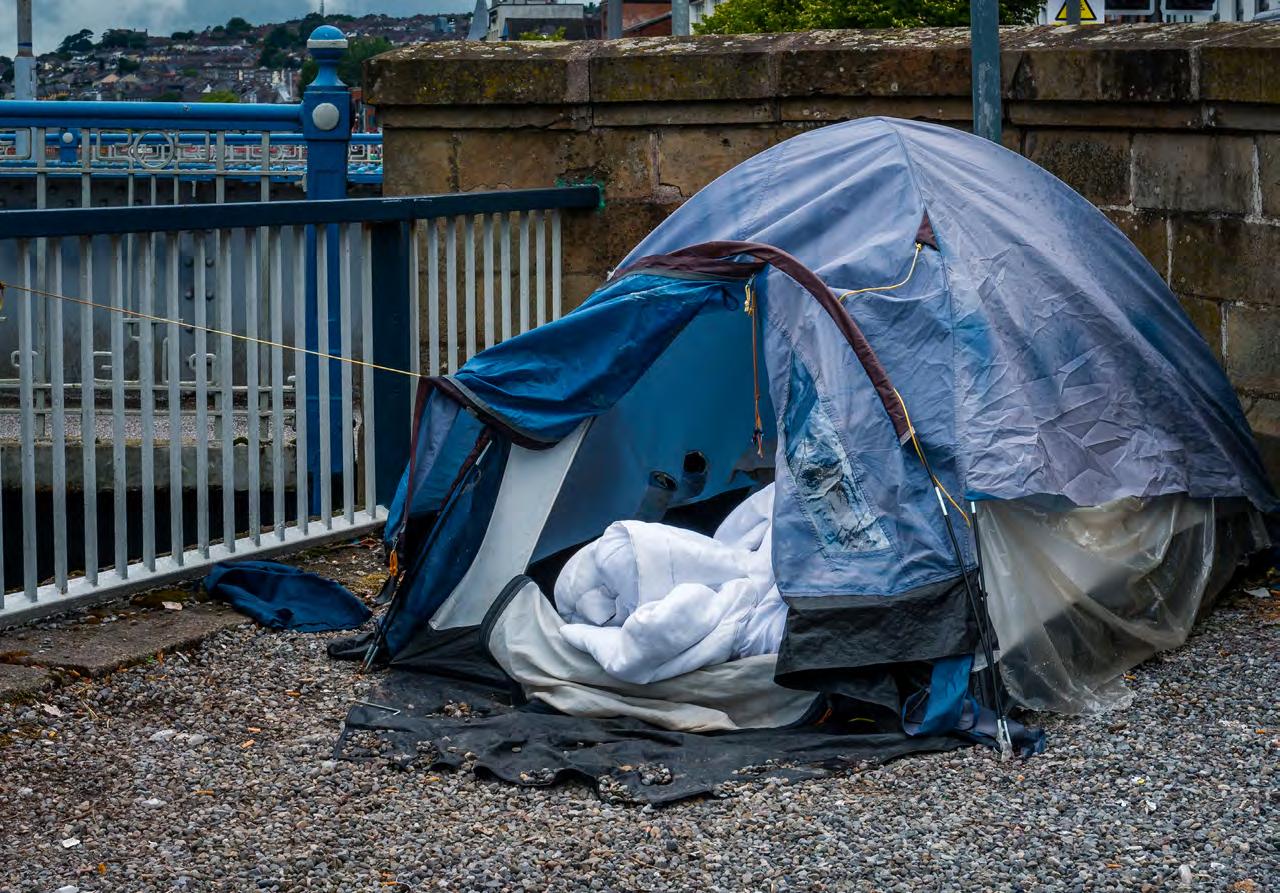
“I push people away at first, but Jasmine never gave up on me, even when she saw me at my worst,” said Justine. “I felt so alone. But then I had someone in my corner; I knew someone cared. You guys are the best! I just hope that in sharing my story, I can inspire someone else to keep fighting and get help.”
Justine, AmeriHealth Caritas New Hampshire member
On April 24, 2021, AmeriHealth Caritas New Hampshire participated in a National Prescription Drug Take Back Day event hosted by the Franklin Mayor’s Drug Task Force and the Franklin Police Department. The goal of the events is to provide a safe, easy, and convenient way for people to properly dispose of unwanted or unused medications — no questions asked.
Residents of Franklin were invited to come to the CVS Pharmacy® on Central Street, where no-contact drop boxes were made available. In addition, AmeriHealth Caritas New Hampshire sponsored lockboxes that were made available to participants at no cost for them to use to properly lock up any medication they have in their home.
In February 2020, AmeriHealth Caritas New Hampshire entered into an agreement with Groups Recover Together to expand access to opioid addiction treatment options — including medication-assisted treatment (MAT) — for our members.
This is just one of the ways we are working to help the Granite State tackle a key barrier to addressing the opioid crisis. Medicaid health plans are often on the front lines of substance use disorder treatment. Working with our community partners to decrease barriers to treatment is paramount. We are proud to be working with Groups Recover Together to bring much-needed substance use care to our members in New Hampshire.
“The opioid epidemic is a national crisis with heartbreaking local impact. It hurts our health, our neighborhoods, and our local economy. Treatment is available, but it needs to be affordable and accessible within the communities that are affected. That is what Groups Recover Together is doing so well. Our unique model is spreading care, saving lives, and driving industry-leading outcomes.”
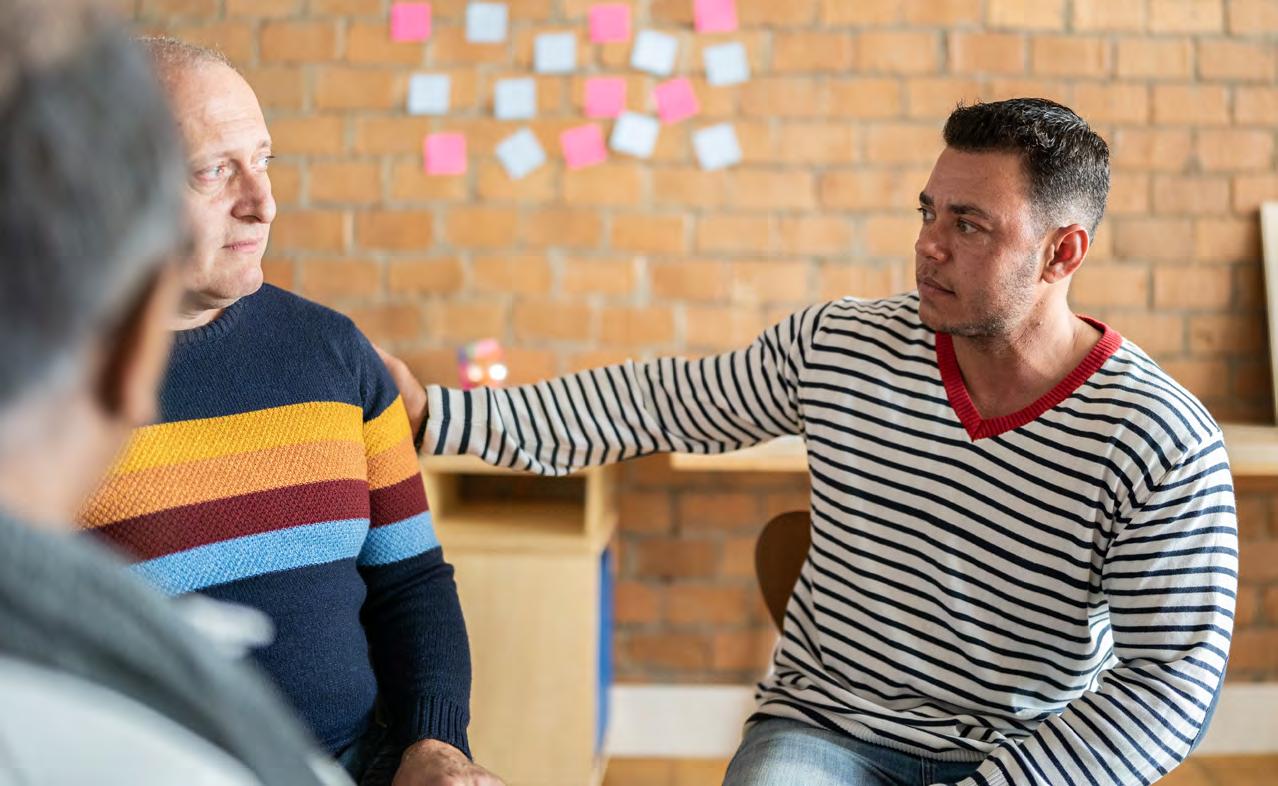 Jacob “Gus” Crothers, M.D., National Medical Director, Groups Recover Together
Jacob “Gus” Crothers, M.D., National Medical Director, Groups Recover Together